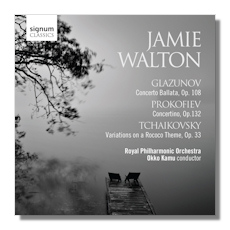
The Internet's Premier Classical Music Source
Related Links
-
Glazunov Reviews
Prokofieff Reviews
Tchaikovsky Reviews - Latest Reviews
- More Reviews
-
By Composer
-
Collections
DVD & Blu-ray
Books
Concert Reviews
Articles/Interviews
Software
Audio
Search Amazon
Recommended Links
Site News
 CD Review
CD Review
Russian Works for Cello & Orchestra

- Alexander Glazunov:
- Concerto Ballata, Op. 108
- Chant du menestrel, Op. 71
- Melodie, Op. 20 #1
- Serge Prokofieff: Concertino, Op. 132: I. Andante mosso
- Piotr Ilyitch Tchaikovsky:
- Nocturne, Op. 19 #4
- Variations on a Rococo Theme, Op. 33
Jamie Walton, cello
Royal Philharmonic Orchestra/Okko Kamu
Signum Classics SIGCD407 73:41
This is a fine disc from Signum Classics, showcasing the considerable talent of British cellist Jamie Walton in works that mainly look backward in style and expressive manner. The 1931 Glazunov Concerto Ballata is a lovely, lyrical piece from late in the composer's career. It's clearly a work that hearkens back to the late 19th century in spirit and sound. Let's face it, Glazunov was not exactly a progressive in composition to begin with. Walton and Kamu collaborate for a lush rendering of this lovely piece, allowing the mostly singing character of the music to shine through. Actually, I couldn't help but think that parts of the score remind one of the lyrical, Romantic side of Ralph Vaughan Williams and Edward Elgar. That's an unlikely association to make and any similarities are probably a coincidence, as Glazunov, though living in Paris at the time of the work's composition, was likely not too familiar with the music of either composer. Still…. Anyway, this performance is thoroughly convincing, as are the renditions of the popular Chant du Menestral and Melodie.
The Tchaikovsky Rococo Variations represents the composer's way of tipping his hat to Mozart. The work was written with the help of cellist Wilhelm Fitzenhagen, who made emendations to Tchaikovsky's work without approval, emendations that remain in the score in most performances of the piece even today. Jamie Walton performs the original version here – more or less – because there are some changes by Fitzenhagen retained, though all eight variations are given, not seven as employed by Fitzenhagen.
Walton's performance is excellent: he conveys the rococo style of the piece well and captures the elegance and graceful character of the music with a deft touch. He does not attempt to overpower the work with too muscular a tone, but isn't particularly deferential either, remaining alert to the shifting moods and brilliant colors of Tchaikovsky's attractive score. Okko Kamu draws fine support from the Royal Philharmonic Orchestra. Walton and Kamu also collaborate for a lovely account of the brief Nocturne, an arrangement by the composer of a piano piece.
The Prokofiev Concertino has one of the strangest and most cursed histories in all of music. More people associated with it died than with any other work I know of. While composing it Prokofiev died (1953), leaving the Concertino unfinished in piano score, with a complete second movement and a mostly complete first. Only sketches existed for the finale. Rostropovich completed a version for piano and cello and then Kabalevsky orchestrated it. Cellist Steven Isserlis modified that version and used a cadenza by pianist/composer Olli Mustonen to replace one written by Rostropovich. Composer/musicologist Vladimir Blok, at the behest of Isserlis, worked on another version of the Concertino but died just before completing it. Alfred Schnittke accepted cellist Alexander Ivashkin's proposal to write a cadenza for the work but, after developing several ideas for it, died before realizing them. Various versions of the Concertino have been drawn from these efforts. The one used by Jamie Walton is the Rostropovich/Kabalevsky, orchestrally the biggest and most extravagant of them all.
Walton plays with a creamy tone and rightly points up the mellow character of the work and its rich lyricism. The second movement is especially lovely in his hands, but the outer movements are also brilliantly interpreted. This is a fine rendition, possibly the best account of this particular version of the work. Both Rostropovich and David Geringas recorded it, though I have not heard the Rostropovich. Geringas is quite good, but it's fair to say that Walton's is not only thoroughly convincing but also has the best recorded sound. There are a half-dozen or so recordings of other versions of the work but anyone wanting the Rostropovich/Kabalevsky version can't go wrong with this excellent performance.
The sound reproduction on this disc is vivid and well balanced. The album notes are informative. Strongly recommended.
Copyright © 2015, Robert Cummings





















